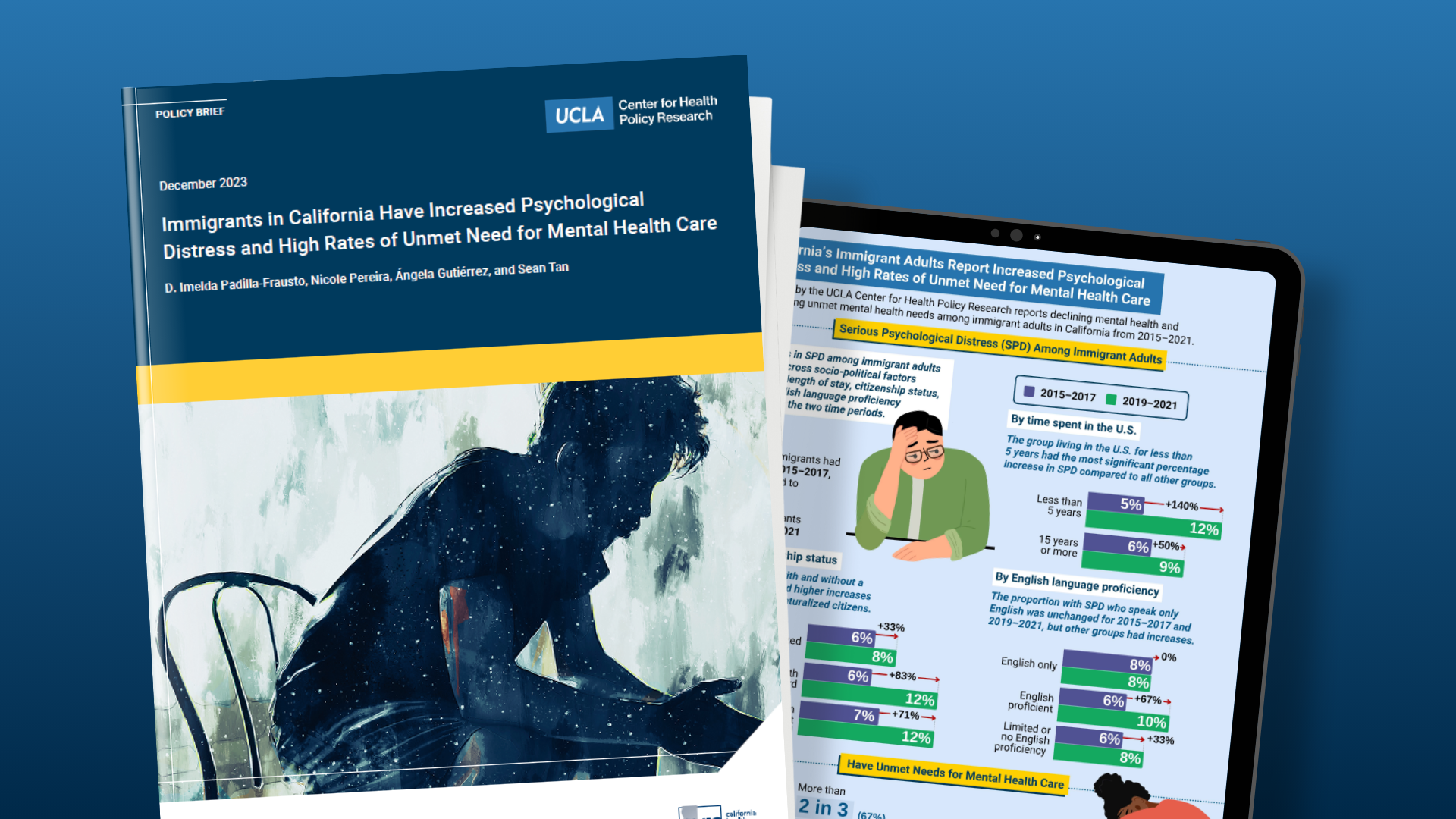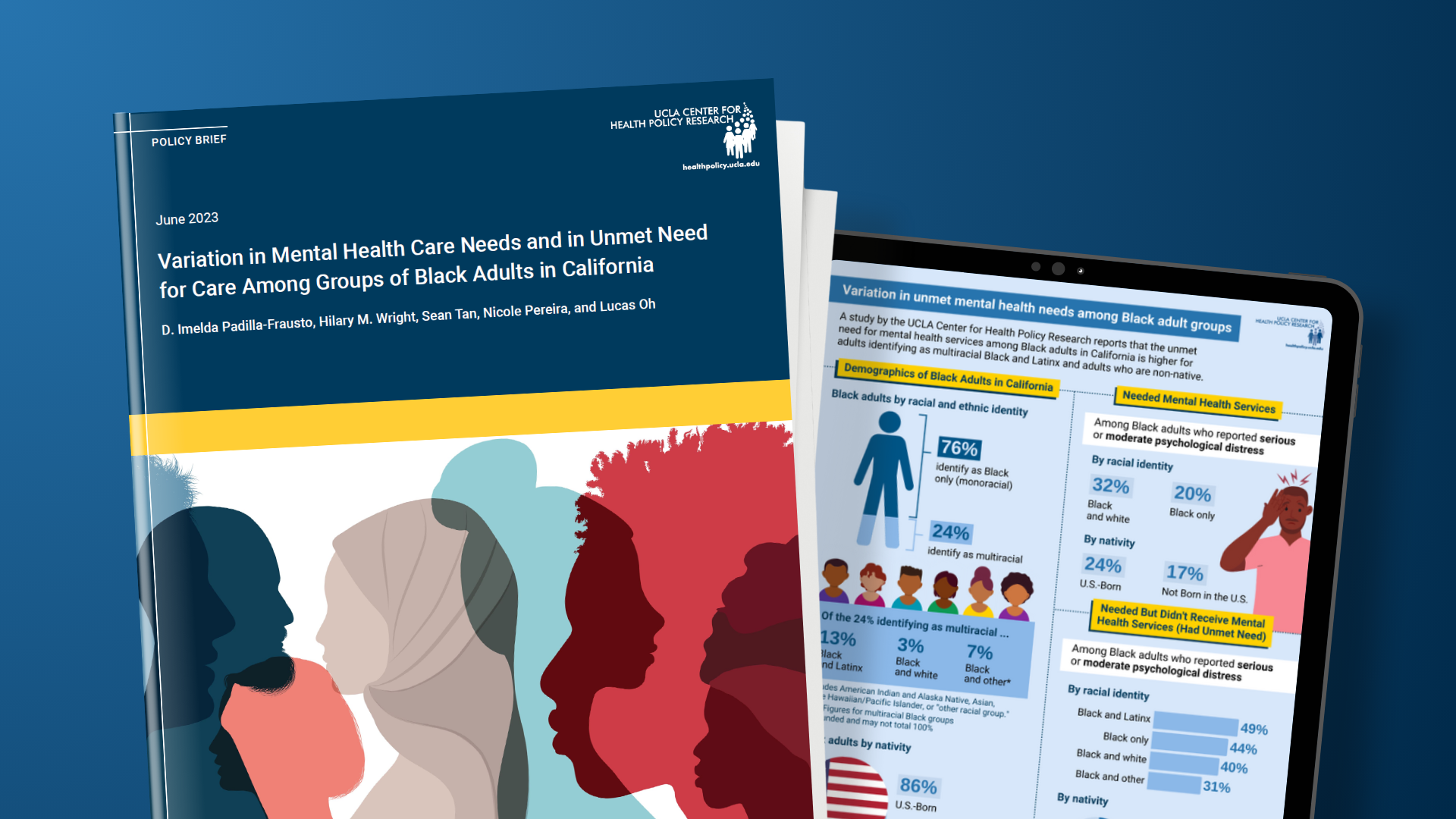According to the 2018 California Health Interview Survey, over 3.2 million adults in California reported that they had serious psychological distress in the past year. Mental health issues have also had a tremendous impact on work, with about 72% of respondents experiencing mental health problems stating that they had to take time off of work, and 1 in 5 reported that they were unable to work for more than three months.
D. Imelda Padilla-Frausto, a research scientist at the UCLA Center for Health Policy Research, has focused her research on social and environmental factors related to mental health, access to mental health services, and economic insecurity. In this brief interview, she discusses the continued need for mental health research, the link between the COVID-19 pandemic and mental health distress, and policy implications discussed in an upcoming policy brief she is authoring, which calls for some added support for individuals experiencing moderate psychological distress.
Q: How did you get into mental health research? What is the current landscape of this type of research and in what ways can it be improved?
My research into mental health began when I was a teenager trying to understand and help a loved one when they were diagnosed with a serious mental illness. From the challenging times of getting them the proper services and care to the celebratory times of recovery and watching them graduate with their bachelor’s degree, it was these experiences that led me to dedicate my career to mental health research.
The landscape of mental health research is expanding in exciting ways. We are learning so much more about the brain, biological markers, and treatments have been improving over the years. At the same time, we also know that there are many psychosocial factors that contribute to poor mental health and mental disorders, and we are learning more about the combination of psychosocial and biological markers from various studies. I am beginning to see more efforts to take a public health approach to mental disorder which include strategies for preventing mental disorders and intervening early to mitigate the severe and disabling effect of serious mental illnesses.
The National Institute of Mental Health (NIMH), the lead federal agency on mental health research, recently published their strategic plan for research, which I’m happy to see incorporates each of these aspects. I think to ensure NIMH efforts are achieving positive results, it will be crucial to develop and establish mental health surveillance systems at the national, state, and local levels to collect population-level data on mental health and service use outcomes. These efforts would also need to include more frequent psychiatric epidemiological surveys. The last Collaborative Psychiatric Epidemiological Surveys were conducted nearly two decades ago (2001-2003) even though the landscape of psychosocial factors contributing to poor mental health and improvements in treatment has changed during that time.
One aspect of mental health research that I believe is not given enough attention is in the area of mental health services and policies. I believe more needs to be investigated in this area to better understand the complexities of accessing timely and appropriate care that is culturally relevant and linguistically appropriate. There is a crucial need for collecting current mental health data and conducting more mental health service research, as about 1 in 5 U.S. adults experience mental illness and 1 in 25 experience serious mental illness, according to the National Alliance on Mental Illness, but only about one-half receives the services they need.
Q: How is the current pandemic affecting the mental health of Americans and individuals across the globe? Will there be an assessment of the impact of COVID-19 on mental health?
The COVID-19 pandemic has undoubtedly affected mental health across the U.S. and beyond ─ from grieving the loss of loved ones to having uncertainty about the future. The public health crisis has removed us from our normal routines: children are out of school, unemployment rates have risen drastically, those who have jobs are working from home if they are able to, and there are restrictions on leaving the house to help “flatten the curve.” I’d assume many people are finding it difficult to adjust to this “new normal”, which unfortunately has put many children’s and families’ mental health at-risk if they are in living situations with difficult family dynamics or where domestic violence exists. Due to massive economic losses, individuals are experiencing issues accessing essential resources such as food and not being able to pay for housing, rent, and other necessities, also contributing to a great deal of mental and psychological distress. There’s also added mental and physical stress on individuals who are at a higher risk for being infected, such as those with chronic, underlying conditions and older adults.
Yes, there is definitely going to be analyses of how COVID-19 has impacted (or will continue to impact) the mental health of individuals across the country. NIMH has rolled out the Mental Health Impact of COVID-19 Pandemic Study, which aims to assess the impact of the current public health emergency. Also, with COVID-19 questions included in the California Health Interview Survey (CHIS) since March 2020, researchers will be able to assess the mental health impact of this pandemic.
The United Nations published a policy brief COVID-19 and the Need for Action on Mental Health that discusses the mental health impact from the 2008 economic crisis which included a rise in “deaths of despair” among working age Americans. Suicide and substance-use accounted for most of these deaths and were linked to the loss of hope due to the lack of employment and rising inequality. As the economic burden from COVID-19 increases, the short and long-term mental health impacts on individuals, families, and society as a whole must not be overlooked, there needs to be ongoing assessments. I imagine other researchers and public health advocates will want to look at the mental health services and supports needed across diverse groups.
Q: Can you give us a preview of the upcoming policy brief and suggested steps to bridge the gaps in mental health services for individuals experiencing mental distress?
The suggestions in the upcoming brief talk about the passage of the California Mental Health Services Act (also known as Proposition 63) and efforts to expand mental health services in the state, in particular, prevention and early intervention services. While there have been efforts to identify service needs for individuals with serious psychological distress, this policy brief is the first to identify service needs for individuals with moderate psychological distress who may benefit from prevention and early intervention services. Our findings highlight that funding and resources need to be dedicated to expanding services to almost 2 million Californians who have serious or moderate psychological distress but who have not accessed professional help in the past year. In March 2020, the Kaiser Family Foundation conducted a poll that found that almost 50% of adults reported that the pandemic has affected their mental health and 19% said that there was a major impact on their mental health. As such, we also suggest legislation may be needed to devote funding to address the likelihood of having a heightened demand for mental health services. Our policy brief will be published in mid-July and in the upcoming year we will be increasing our mental health research portfolio with a series of policy briefs on the increase in serious psychological distress over the past two years, the mental health of Latino and Asian ethnic groups and their use of services, women’s mental health, and a fact sheet on teen mental health. We hope to engage stakeholders to move progress forward in the field.











